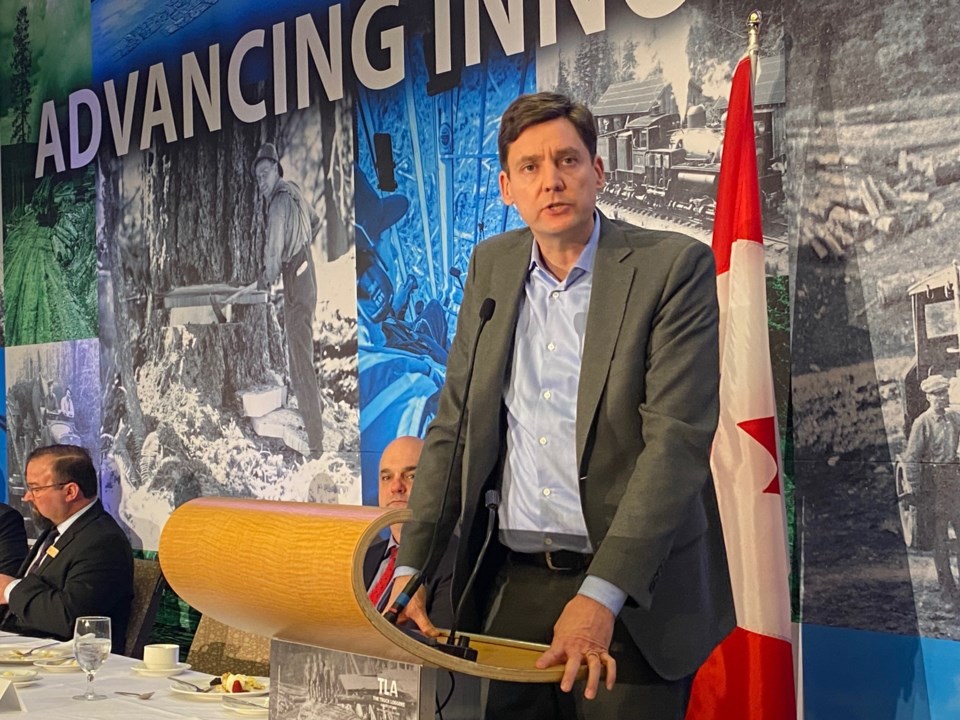David Eby appears to be ready to put B.C. on a trade war footing in response to American tariff threats, with an arsenal that includes supporting federal taxes and bans on exports, like critical minerals, and bolstering B.C.'s energy and resource sector to make it more competitive by accelerating permitting for energy and resource projects, and reforming government programs like BC Timber Sales.
No industry in Canada understands the negative impact of American duties and tariffs better than the B.C. forestry sector, which has been labouring under American duties on softwood lumber for nearly a decade now.
“This industry is very much under siege,” Eby said in a speech Thursday at the annual Truck Loggers Association Convention.
Eby said that, while B.C. is “better placed” than some provinces, because of its more diverse export markets, he warned that the impacts of 25 per cent tariffs on B.C. exports to the U.S. would be grim.
While some consider Trump’s threat of tariffs on Canadian goods to be a bluff, Eby’s government is taking the threat seriously.
“What we do know is that every source of intelligence we have coming from south of the border is that the duties will be imposed,” he said.
He said the tariffs, if they persisted for the duration of a four-year Trump term, could affect 100,000 jobs and have a cumulative cost to the province of $60 billion in GDP.
Eby said he would encourage the Canadian government to respond to the tariffs with taxes and bans on key exports, like the germanium, a critical mineral, produced as a by-product at the Teck Resources (TSX,NYSE:TECK) lead-zinc smelter in Trail, B.C.
B.C. forestry companies already pay an average of 14.4 per cent in duties on lumber exports to the U.S., and they could double next year. It's unclear whether the 25 per cent tariffs Trump has threatened would be additive to existing duties.
“We don’t know at this point whether the 25 per cent proposal is in addition to the existing duties,” Eby said.
Forestry companies in B.C. face an even stiffer tariff of sorts right here at home, in the form of regulatory burdens, including policies that have restricted access to timber, and stumpage charges that can make the available timber uneconomic to cut.
“I know that our government and policies have been a source of frustration for a number of people in the room,” Eby acknowledged.
He suggested some relief may be on the way for resource industries in B.C.
A mandate letter to the minister of Environment directs the minister to direct the B.C. Environmental Assessment Office to work with other permitting ministries and agencies to expedite permitting for major projects.
Some of those projects include power projects, like wind farms and transmission lines. It’s unclear whether it would also apply to LNG projects, like the Ksi Lisims LNG project now making its way through the EAO.
One key reform will be to BC Timber Sales. Eby has struck a new task force with the mandate of overhauling it.
“This is not another study,” Eby said, in response to suggestions Thursday that an NDP government was just doing what NDP governments past have always done in response to challenges: strike a committee or task force to "study" the problem.
BC Timber Sales was established in no small part as a response to the American lumber lobby, which has, for decades, successfully argued for duties on Canadian lumber imports on the basis that Canadian timber comes from public (Crown) lands -- unlike the U.S., where most timber comes from private forest holdings -- and therefore is essentially subsidized by the Canadian governments.
BC Timber Sales accounts for about 20 per cent of the timber harvested from Crown lands, and uses auctioning to establish market pricing in order to set the rates (stumpage) charged to forestry companies to harvest timber on Crown lands.
Forestry companies have complained that the rates are often too high, not responsive enough to lumber price swings, and can make it uneconomic to harvest timber, even when it is available for harvest.
During the recent provincial election campaign, B.C. Conservative Leader John Rustad pledged to eliminate the stumpage system altogether and replace it with a tax on end products.
Eby did not say whether the stumpage system itself will be reformed or replaced as part of the BC Timber Sales overhaul, but did give some hints that suggest it might.
“The elaborate process that we go through with B.C. Timber Sales in order to appease the Americans on softwood lumber duties has absolutely not done that,” he said. “The tariffs continue, the tariffs continue to get higher, and the process is not working for anybody.
“One of the anxieties that we have around with tinkering with BC Timber Sales is this was a key response to the softwood lumber duties, and so if we change that, this results in higher duties…and we really wanted to avoid giving them the excuse to do that.
“Obviously, now, in the context of 25 per cent across-the-board tariffs – we are in a trade war with the United States – that anxiety goes away.”




